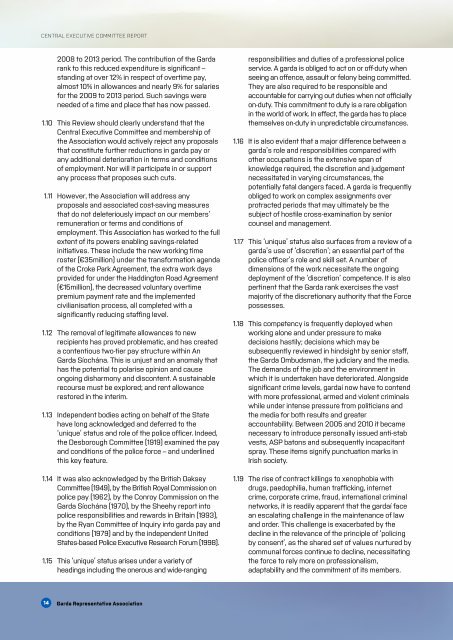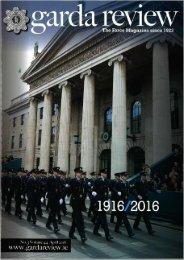Conference Report 2016
Table of contents contains links on page 5. It can be used to skip through chapters.
Table of contents contains links on page 5. It can be used to skip through chapters.
Create successful ePaper yourself
Turn your PDF publications into a flip-book with our unique Google optimized e-Paper software.
CENTRAL EXECUTIVE COMMITTEE REPORT<br />
2008 to 2013 period. The contribution of the Garda<br />
rank to this reduced expenditure is significant –<br />
standing at over 12% in respect of overtime pay,<br />
almost 10% in allowances and nearly 9% for salaries<br />
for the 2009 to 2013 period. Such savings were<br />
needed of a time and place that has now passed.<br />
1.10 This Review should clearly understand that the<br />
Central Executive Committee and membership of<br />
the Association would actively reject any proposals<br />
that constitute further reductions in garda pay or<br />
any additional deterioration in terms and conditions<br />
of employment. Nor will it participate in or support<br />
any process that proposes such cuts.<br />
1.11 However, the Association will address any<br />
proposals and associated cost-saving measures<br />
that do not deleteriously impact on our members’<br />
remuneration or terms and conditions of<br />
employment. This Association has worked to the full<br />
extent of its powers enabling savings-related<br />
initiatives. These include the new working time<br />
roster (€35million) under the transformation agenda<br />
of the Croke Park Agreement, the extra work days<br />
provided for under the Haddington Road Agreement<br />
(€15million), the decreased voluntary overtime<br />
premium payment rate and the implemented<br />
civilianisation process, all completed with a<br />
significantly reducing staffing level.<br />
1.12 The removal of legitimate allowances to new<br />
recipients has proved problematic, and has created<br />
a contentious two-tier pay structure within An<br />
Garda Síochána. This is unjust and an anomaly that<br />
has the potential to polarise opinion and cause<br />
ongoing disharmony and discontent. A sustainable<br />
recourse must be explored; and rent allowance<br />
restored in the interim.<br />
1.13 Independent bodies acting on behalf of the State<br />
have long acknowledged and deferred to the<br />
‘unique’ status and role of the police officer. Indeed,<br />
the Desborough Committee (1919) examined the pay<br />
and conditions of the police force – and underlined<br />
this key feature.<br />
1.14 It was also acknowledged by the British Oaksey<br />
Committee (1949), by the British Royal Commission on<br />
police pay (1962), by the Conroy Commission on the<br />
Garda Síochána (1970), by the Sheehy report into<br />
police responsibilities and rewards in Britain (1993),<br />
by the Ryan Committee of Inquiry into garda pay and<br />
conditions (1979) and by the independent United<br />
States-based Police Executive Research Forum (1998).<br />
1.15 This ‘unique’ status arises under a variety of<br />
headings including the onerous and wide-ranging<br />
responsibilities and duties of a professional police<br />
service. A garda is obliged to act on or off-duty when<br />
seeing an offence, assault or felony being committed.<br />
They are also required to be responsible and<br />
accountable for carrying out duties when not officially<br />
on-duty. This commitment to duty is a rare obligation<br />
in the world of work. In effect, the garda has to place<br />
themselves on-duty in unpredictable circumstances.<br />
1.16 It is also evident that a major difference between a<br />
garda’s role and responsibilities compared with<br />
other occupations is the extensive span of<br />
knowledge required, the discretion and judgement<br />
necessitated in varying circumstances, the<br />
potentially fatal dangers faced. A garda is frequently<br />
obliged to work on complex assignments over<br />
protracted periods that may ultimately be the<br />
subject of hostile cross-examination by senior<br />
counsel and management.<br />
1.17 This ‘unique’ status also surfaces from a review of a<br />
garda’s use of ‘discretion’; an essential part of the<br />
police officer’s role and skill set. A number of<br />
dimensions of the work necessitate the ongoing<br />
deployment of the ‘discretion’ competence. It is also<br />
pertinent that the Garda rank exercises the vast<br />
majority of the discretionary authority that the Force<br />
possesses.<br />
1.18 This competency is frequently deployed when<br />
working alone and under pressure to make<br />
decisions hastily; decisions which may be<br />
subsequently reviewed in hindsight by senior staff,<br />
the Garda Ombudsman, the judiciary and the media.<br />
The demands of the job and the environment in<br />
which it is undertaken have deteriorated. Alongside<br />
significant crime levels, gardaí now have to contend<br />
with more professional, armed and violent criminals<br />
while under intense pressure from politicians and<br />
the media for both results and greater<br />
accountability. Between 2005 and 2010 it became<br />
necessary to introduce personally issued anti-stab<br />
vests, ASP batons and subsequently incapacitant<br />
spray. These items signify punctuation marks in<br />
Irish society.<br />
1.19 The rise of contract killings to xenophobia with<br />
drugs, paedophilia, human trafficking, internet<br />
crime, corporate crime, fraud, international criminal<br />
networks, it is readily apparent that the gardaí face<br />
an escalating challenge in the maintenance of law<br />
and order. This challenge is exacerbated by the<br />
decline in the relevance of the principle of ‘policing<br />
by consent’, as the shared set of values nurtured by<br />
communal forces continue to decline, necessitating<br />
the force to rely more on professionalism,<br />
adaptability and the commitment of its members.<br />
14 Garda Representative Association




